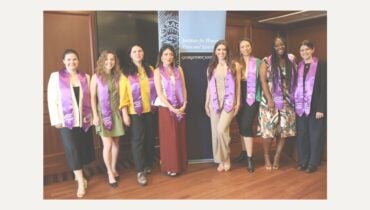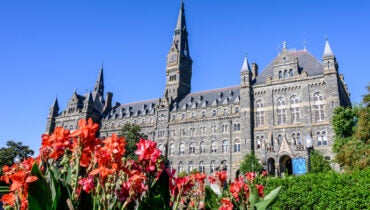This fall, Georgetown University is offering a variety of graduate courses that leverage a gender lens to explore some of the most pressing issues of our time. There are also a number of undergraduate classes on offer that address issues of diversity, equity and inclusion. Use this list as a resource while making your fall course selections.
Fall 2023 Graduate Courses with a Gender Lens
These graduate classes count towards the Georgetown Institute for Women, Peace and Security (GIWPS) Graduate Certificate in Gender, Peace and Security.
Strategizing Gender Justice (MSFS-6630; CRN: 44167; PPOL-6364; CRN: 43392)
Professor: Karine Lepillez
Time: Friday, 9:30 a.m. – 12:00 p.m.
This course explores strategies for change. The class will examine the formal and informal structures and rules that influence gender justice efforts in US and international institutions, introducing students to feminist governance theories and frameworks and applying this knowledge to case studies of US gender policy change efforts.
Gender and Migration in Europe (GEST-5402; CRN: 38457)
Professor: Joyce Mushaben
Time: Wednesday, 12:30 p.m. – 3:00 p.m.
This course analyzes a complicated web of labor migration patterns, refugee flows, family unification trends, asylum policies and human-trafficking challenges intricately connected to globalized production and consumption chains. It addresses the “securitization” of border controls introduced in the wake of the 2015 refugee crisis, relegating women’s rights as human rights to the back burner in violation of the EU gender acquis.
Women’s Empowerment in the Global South (MSFS-6600; CRN: 42133)
Professor: S. Ayse Kadayifci-Orellana & Claudia Youakim
Time: Wednesday, 5:00 p.m. – 7:30 p.m.
Advancing women’s empowerment is key to effective foreign policy. Research shows that countries are more peaceful and stable when women are empowered. Models for advancing the status of women and girls have been developed by governmental agencies, multilateral institutions, development banks, civil society and the private sector. Women’s empowerment is also a core dimension of the Women, Peace and Security Agenda – a key international policy framework that calls for the meaningful participation of women in all aspects of conflict resolution and peacebuilding.
(En)gendered Security (SEST-6639; CRN: 40391)
Professor: Mariya Y. Omelicheva
Time: Wednesday, 6:30 p.m. – 9:00 p.m.
This course is designed to illuminate the multiple and complex intersections of women, peace, and security that are recognized as well as omitted in national and international legislation, policies, and practice. The course advances and critically assesses three related themes. First, gender is conceptually and theoretically necessary to thinking about security itself and central questions of security, to include war, conflict, and peace. Second, gender is indispensable to explaining the complex cause and effect relationships over a range of security issues. And, third, gender is important from the policy standpoint for devising sustainable and effective approaches for making the world a more secure place for everyone regardless of their social identity.
Cyber Policy & Strategy (MSFS-7515; CRN: 44430)
Professor: Alan Dinerman
Time: Wednesday, 5:00 p.m. – 7:30 p.m.
This course investigates the full spectrum of cyber policy and strategy through the lens of whole of nation engagement. The class examines cyber to encompass defensive cyber, cyber intelligence, and offensive cyber operations. Through study of key doctrine, exploration of case studies, and active policy development exercises, course participants will gain the ability to evaluate prominent cyber strategies / policies, and propose approaches to potential national cyber challenges. Topics covered include, but are not limited to, the tensions and synergies inherent to concepts such as persistent engagement, international norms, vulnerability disclosure, and intelligence- gain loss.
Indigenous Peoples of the Americas and Power-Based Violence (GOVT 5668 CRN: 42493)
Professor: Veronica Quinonez
Time: Thursday, 5:00 p.m. – 7:30 p.m.
This course will examine various forms of power-based violence including intimate partner violence, stalking, and sexual violence as it impacts Indigenous Americans. We will review theories about frequency and prevalence of power based violence in Indigenous communities of the Americas and larger historical contributors to violence against Indigenous Americans. We will later evaluate current systems and policies that exist in relation to power based violence and how these institutions can help or hinder Indigenous survivors. The course culminates in a final project where students are asked to analyze an existing Indigenous-led program, policy, law, etc rooted in violence prevention or intervention.
The following classes also count towards the Gender, Peace and Security Certificate – but are currently full. However, if you are interested in taking this course, we encourage you to enroll on the waitlist.
Gender, International Security and Development (MSFS-5600 CRN:40002)
Professor: S. Ayse Kadayifci-Orellana
Time: Monday, 2:00 p.m. – 4:30 p.m.
This class contextualizes gender issues and asks the question: how would we think about international peace, security, development approaches, and design intervention strategies if gender was treated a central consideration in international affairs and peacebuilding programming? To answer this question, the class will explore both conceptual considerations related to gender and its practical application. This is a required course for the Gender, Peace and Security certificate.
Gender and Security Toolbox (GOVT-5636 CRN: 38894; MSFS-7610 CRN: 38227)
Professor: Aapta Garg
Time: Tuesday, 5:00 p.m. – 7:30 p.m.
This advanced seminar will teach you concrete skills for ensuring gender is considered in peacebuilding, security, and development fields. The course will explore critical skills – from gender mainstreaming and gender analysis to gender-sensitive budgeting, research, monitoring & evaluation, and advocacy. The course will enable students to capably serve as gender focal points and learn how practitioners have successfully advanced gender in their diplomacy, development, and defense work. This is a required course for the Gender, Peace and Security certificate.
Forgotten Women in Mass Crimes (JCIV-4500 CRN: 44086; MSFS-6610 CRN: 43275)
Professors: Patrick Desbois, Andrej Umansky
Time: Tuesday, 6:30 p.m. – 9:00 p.m.
Why is violence against women and girls are so frequently forgotten or “silenced” in mass crimes and genocide? Why are acts of violence against women and girls so frequently obliterated from the Holocaust narrative, the Roma genocide narrative, and Guatemala’s mass violence history? From ISIS’ terrorist narrative before the courts of law? From news emerging from Ukraine? Do ground investigations have the capacity to reveal the crimes against women, or are they choosing not to? Students will learn how to conduct forensic investigations of violence against women in the scope of genocide and mass crimes and learn from field investigations of Fr. Patrick Desbois and his team.
Gender and Sexuality in South Asia (ASST-4045; CRN: 41654)
Professor: Cecilia Van Hollen
Time: Tuesday, 3:30 p.m. – 6:00 p.m.
This course provides students with an introduction to anthropological approaches to the study of gender and sexuality in South Asia through ethnographic books, articles and documentaries. We will explore how cultural ideas about gender and sexuality are constructed, maintained, and challenged in the South Asian context, keeping in mind South Asia’s global connections from the colonial period to the present. Key topics of the course include the intersections of gender/sexuality, work, and migration; gender, class and caste; LGBTQ+ identities and activism; gender/sexuality and nationalism; gender/sexuality and religion; gender/sexuality, politics and law; and gender, health and the body.
Hunter(M)/Gatherer(F) & National Security (SEST-6700; CRN: 41885)
Professor: Gina Bennett
Time: Thursday, 5:30 p.m. – 9:00 p.m.
This course will examine the reasoning behind the evolution of today’s national and international security from its “Man the Hunter” origins by surveying the biological, psychological, anthropological, and cultural explanations for how we define security, dominance, and power. Students will also get an opportunity to consider and create national-level strategy based on a spectrum of “hunter-gatherer” understanding of security.
Global Cyber Threats (SEST-6584; CRN: 43666)
Professor: Candice Frost
Time: Monday, 5:00 p.m. – 7:30 p.m.
Who are the hackers we hear so much about? This course will answer that question not just with broad terms like “Russia” and “China” but with more focused and nuanced analysis. We will focus on known hacking groups, their methods, motivations, and relationship to greater geopolitical developments. The course will focus primarily on state-affiliated threats, though it will touch other realms of the cyberthreat ecosystem as well. Students completing this course will have a foundational knowledge of what nations are doing in cyberspace, an important step towards subject matter expertise. For example, we will examine how different Russian hacking groups have different aims and methods, even as they target the same United States organizations. Prior technical knowledge is not a prerequisite, though many important concepts will be introduced during the course. We will examine many case studies of historic and contemporary adversary behavior. Students will gain strategic perspective by examining reporting that will include tactical, operational, and strategic insights. Many of these examples are available in the open source literature, but additional context will be provided in class discussion.
In addition to graduate courses, the University also offers a large variety of undergraduate classes engaging with gender and other Diversity, Equity, & Inclusion (DEI) topics. For undergraduate students who are interested in learning about how gender, race, class, religion, and other identities intersect with the world around them – we recommend these classes as a starting point, though Georgetown offers many wonderful options.
Fall 2023 Undergraduate Courses that address Diversity, Equity & Inclusion
In addition to graduate courses, the university also offers a large variety of undergraduate classes engaging with gender and other diversity, equity, and inclusion (DEI) topics. For undergraduate students who are interested in learning about how gender, race, class, religion, and other identities intersect with the world around them – we recommend these classes as a starting point, though Georgetown offers many wonderful options.
- Black Digital Feminisms, Professor Brienne Adams (CRN: 43566)
- Gender and Economic Development, Professor Lamis Kattan (CRN: 44137)
- Gender and Migration in Europe, Professor Joyce Mushaben (CRN: 38457)
- White Supremacy in International Relations, Professor Desha Girod (CRN: 43597)
- Women, Peace and Security, Professors S. Ayse Kadayifci-Orellana and Robert Nagel (CRN: 38818)
- Bodies, Technology & Violence Professor Katherine Chandler (CRN: 35968)
- Religion in Conflict & Peacebuilding, Professor Sheherazade Jafari (CRN: 43470)
- Population, Gender & Environment, Professor Patricia Biermayr-Jenzano (CRN: 34438)
- Violence/Gender/Human Rights, Professor You-me Park (CRN: 18359)
- Routes, Black Internationalism, Professor Dayo Gore (CRN: 43574)
- Wealth & Poverty of Nations, Professor Shareen Joshi (CRN: 41465)
- Immigration & Conflict, Professor Gregory Brown (CRN: 28759)
- Migration & Human Rights, Professor Ahmed Elobaid (CRN: 43831)
- Faith, Race and Politics, Professor James Wallis (CRN: 43893)
- Gender & Sexuality in South Asia, Professor Cecilia Van Hollen (CRN: 41654)
- Women & Gender in the Middle East, Professor Nadya Sbaiti (CRN: 44087)
- Gender & Feminism, Professor Alisa Carse (CRN: 36064)
- Feminist Disability Studies, Professor Lydia Brown (CRN: 34437)
- Gender, Race, and Feminism, Professor Emerald Christopher (CRN: 36400)
- Challenging Pride: Bias/LGBTQ, Professor Amena Johnson (CRN: 41894)
- Gender, Race & Incarceration, Professor Emily Hainze (CRN: 43646)
- Disciplining the Poor, Professor Rosemary Ndubuizu (CRN: 41832)
- Exploring Race and Diversity, Professor Liliana Duica Amaya (CRN: 44793)
- Place, Race, & Educational Reform, Professor Nardos Ghebreab (CRN: 43910)
- Disability Justice Equity & Politics, Professor Dara Baldwim (CRN: 42594)
- Black Women & Politics of Care, Professor Melanie White (CRN: 43538)
- Nationalism/Identity in the Gulf, Professor Zarqa Parvez (CRN: 44433)
- Migration & Citizenship, Professor Amanda Garrett (CRN: 44149)


